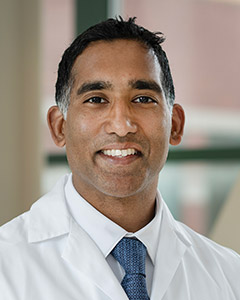
Digestive health is a key to overall well-being. Here’s what you need to know.
You’ve heard the phrase “trust your gut” when it comes to making decisions. But your gut doesn’t just give you intuition for reaching conclusions. It also physically interacts and communicates with the rest of your body in ways that affect your overall well-being.

“The gut microbiome is tremendously important for both immunity and metabolism,” says Arvind Trindade, MD, a gastroenterologist with Robert Wood Johnson University Hospital (RWJUH) and a member of RWJBarnabas Health Medical Group. “A diversified and well structured gut microbiome can help you stay healthy, while any disruption can lead to disease.”
Dr. Trindade and his colleague Petros Benias, MD, also a gastroenterologist with RWJUH and a member of RWJBarnabas Health Medical Group, explain why the gut is so critical—and how you can help it thrive.
What Is the Gut Microbiome?
Think of it as a tiny universe of microorganisms living inside your body. “There are more microbial species in the gut than human cells,” Dr. Trindade says.
Issues with the gut microbiome are medical conditions, including diabetes, obesity and cardiovascular disease. Gut health also plays a role in several types of cancer, including esophageal and colorectal cancers.

How Does the Microbiome Affect Digestive Health?
The microbiome breaks down foods that we eat, but its organisms can act differently based on the foods they encounter.
For example, diets high in fatty, processed foods such as deli meats and bacon are linked to increased numbers of cancer cells in the gastrointestinal (GI) tract. “Processed meats are designated Group 1 [highest-level] carcinogens by the World Health Organization,” Dr. Benias notes.
What Habits Can Improve Gut Health?
Eating a high-fiber diet that includes foods such as berries, whole grains and vegetables like broccoli can promote a range of positive effects.
“Fiber acts like a prebiotic in the gut, which brings two benefits,” Dr. Trindade says. “It stimulates the natural hormone GLP-1, which is essential for weight loss—and obesity is a risk factor in many GI-related cancerous and precancerous conditions, such as Barrett’s esophagus. A high-fiber diet also helps build a strong, thick mucous barrier within the gut, which prevents pathogens from damaging healthy cells.” Regular exercise further benefits gut health and reduces the risk of chronic disease. “Exercise stimulates weight loss,” Dr. Trindade says.
Does Genetics Affect Gut Health?
Family health history can play a role in nearly all digestive health disorders, from irritable bowel syndrome and gastrointestinal esophageal reflux disease (GERD, or heartburn) to conditions such as ulcerative colitis, Crohn’s disease and many GI-related cancers.
Ethnicity may also be a factor: People of Asian descent have a higher risk for gastric or esophageal cancers.
“Have open conversations with your family members about their health history,” Dr. Benias says. “Ask if they’ve experienced any kinds of GI cancers or noncancerous polyps.”
What Are Some Warning Signs of GI Problems?
Routine symptoms such as abdominal pain, cramping, bloating or flatulence may be signs of various illnesses. “If you experience them regularly, get a thorough exam from your primary care physician,” Dr. Trindade says.
Red flags to watch for include bloody stools, trouble swallowing, unexplained weight loss, early satiety (feeling full very soon after starting to eat) and persistent vomiting. “ Take these symptoms seriously,” Dr. Trindade says. “Ask your doctor for a referral to a gastroenterologist immediately.”
Are GI-Related Cancers Becoming More Common?
“Cancer data show a 1 to 2 percent increase in colorectal cancer every year over the last 20 years in people younger than 55,” Dr. Benias says. “That’s a concerning number.”
Additionally, studies show that GI-related cancers (of the colon, appendix and bile duct) are growing fastest among adults 30 to 39. Another analysis has shown that adults 45 to 64 experienced nearly twice the rate of esophageal cancer and a 50 per cent increase in Barrett’s esophagus between 2012 and 2019.
Which screenings can help find GI-related problems early?
Colonoscopy remains the gold standard for identifying colon cancer. The American Cancer Society now recommends that adults start screening for colon cancer at age 45.
Dr. Trindade recommends screenings for Barrett’s esophagus for people who have GERD or those with a family history. “Patients can schedule a separate screening for Barrett’s esophagus, or they can have it done at the same time they have their colonoscopy,” he says.
Exceptional Care for Digestive Disorders
To help people maximize their gut health, RWJBarnabas Health is building a comprehensive digestive disorders program. “We want to create an environment where anyone who needs help with their gastrointestinal system can get the highest standard of care locally,” says Dr. Trindade.
The program includes specialists with expertise in rare and emerging GI disorders. For example, Dr. Trindade specializes in Barrett’s esophagus, and Dr. Benias has clinical expertise in achalasia (a rare swallowing disorder) and complex digestive tract tumors.
Patients will also benefit from the latest research and a team of surgeons and interventional endoscopists—experts in minimally invasive GI treatments.
“Today, we can treat early cancers in the GI tract endoscopically, with same-day procedures that deliver excellent results,” Dr. Benias says. “We aim to achieve curative resection [removal of an organ, a structure or tissue] in more than 90 percent of patients we treat, removing their cancer without invasive surgery.”
Learn more about digestive health care at RWJBarnabas Health.
 View full issues of Healthy Together magazine by New Jersey region:
View full issues of Healthy Together magazine by New Jersey region: